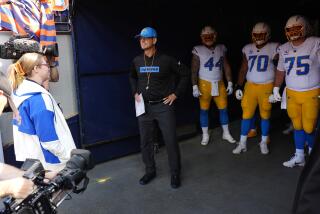Pressure, Self-Consciousness Can Make or Break the Athlete
- Share via
The U.S. women’s gymnastics team choked so often during the all-around competition that the Heimlich maneuver seemed the only merciful response.
Four-time gold medalist and world record holder swimmer Janet Evans failed even to qualify for the 400-meter-freestyle final.
And Carl Lewis nearly didn’t qualify for the long jump final, until miraculously he mustered the distance he needed on his third and final attempt.
How does an elite athlete choke (the dirtiest word in sports, delicately termed the “ch-word” by athletes) during an exercise they have executed perfectly thousands of times?
Psychologists say that the pressure of performing in front of millions for the most desired prize on the planet can either work to the benefit or detriment of an athlete. One psychologist has theorized that blowing it or not depends upon how self-conscious the athlete becomes while performing and, in part, upon the skill required of the sport mixed with the athlete’s personality and maturity.
“There are two main ingredients to most athletic performances: skill and effort,” says Roy Baumeister, a psychology professor at Case Western Reserve University in Cleveland. “Pressure seems to impair skill but improve effort. What causes people to choke on a skill test is paying attention or becoming self-conscious.”
Sports psychologist Steven Hendlin, who practices in Irvine, agrees that self-consciousness can cause an athlete to pull a “Norman” (named after pro golfer Greg Norman, who choked despite a six-stroke lead and managed to lose this year’s Masters). “In a sport like golf, the nerves in small muscle movements are more reactive to the pressure of the moment and you are more susceptible to self-consciousness. When you are using large muscles that can be trained to be on automatic pilot in sports such as running track you are less susceptible to it.”
Even the amateur athlete is influenced by an audience. Studies indicate that when joggers think they are being watched, they pick up their pace.
*
Hendlin believes that younger, less emotionally mature athletes are more susceptible to faltering during performances than older athletes like Lewis who seems nurtured by the public’s expectations of greatness. In the long jump, he, of course, went on to win his ninth Olympics gold medal after coming perilously close to not qualifying.
“There are only a handful of people like Carl Lewis who know how to translate the intensity of extreme performance pressure to succeed and who can use that moment to help them come through,” says Hendlin.
“That is the difference in the emotional maturity of Lewis and Shannon Miller. Lewis likes the attention of the crowd and people cheering--he rides on it. But the more jacked up the feeling in [these young gymnasts] the easier it is for them to make a mistake.”
Baumeister’s choking theory asserts that athletes who trade in sports where the currency is skill (gymnastics, diving, golf) are most affected by sudden bouts of self-consciousness. But in sports based on sheer effort and force of will (running, weightlifting), self-consciousness is less likely to sabotage performance.
Baumeister has tested his theory in numerous lab studies, where he creates pressure by making one trial worth more than another. In one experiment, he measured how fast undergraduates could arrange a deck of cards in numerical order (an effort task) compared to how fast another set of students could play a video game (a skill task). After their fourth performance, Baumeister told both groups that if they beat their previous time, he’d award them $5.
The students sorting the cards improved their time while the others choked under the added pressure, scoring worse than their previous trials. Highly self-conscious students weren’t as affected, Baumeister says, because they have so internalized the feeling of always being scrutinized by others that when it actually happens, it has little power over their psyche.
“For people who are self-conscious all the time, the pressure doesn’t produce as much of a change as it does for someone who only becomes self-conscious during a performance,” he says. “If you have ever played a video game, you will find you don’t perform better when you try harder.”
More to Read
Go beyond the scoreboard
Get the latest on L.A.'s teams in the daily Sports Report newsletter.
You may occasionally receive promotional content from the Los Angeles Times.






